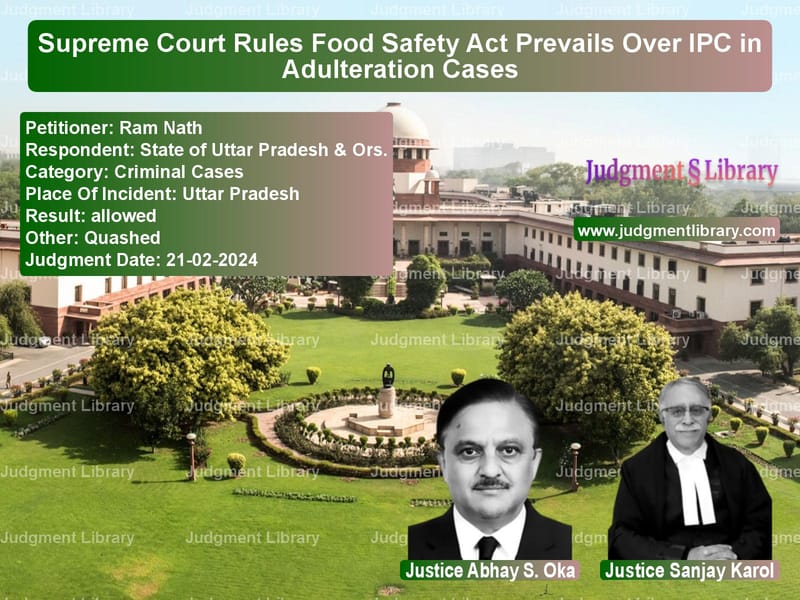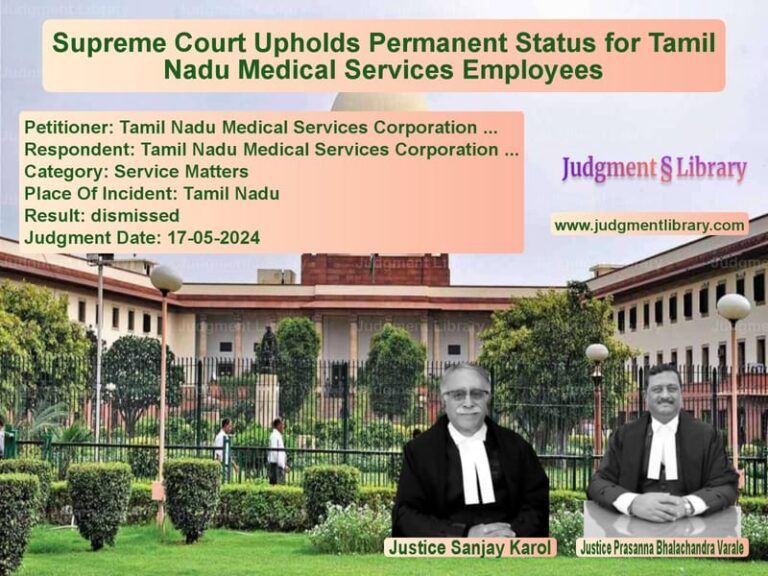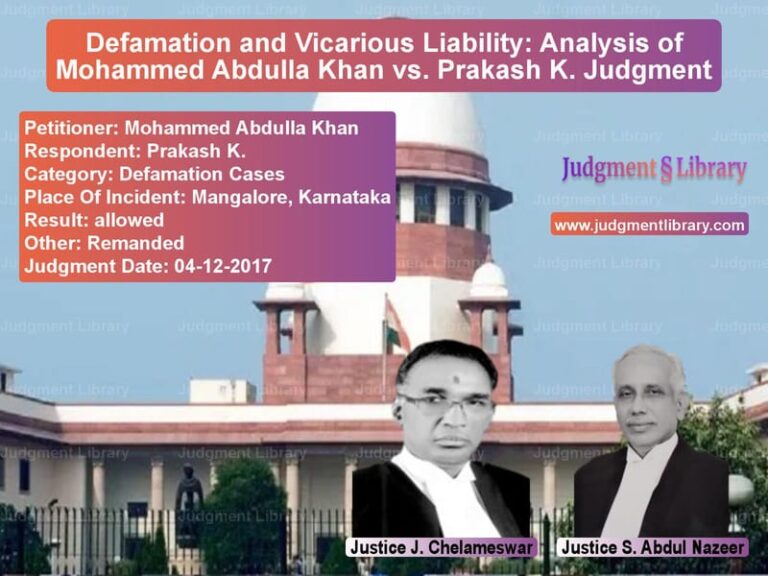Supreme Court Rules Food Safety Act Prevails Over IPC in Adulteration Cases
The Supreme Court, in the case of Ram Nath v. State of Uttar Pradesh & Ors., delivered a significant ruling on the interplay between the Food Safety and Standards Act, 2006 (FSSA) and Sections 272 and 273 of the Indian Penal Code (IPC). The Court held that FSSA, being a special law, has an overriding effect on general penal provisions in matters related to food adulteration. This judgment resolves conflicting interpretations on whether food-related offenses can be prosecuted under IPC or exclusively under FSSA.
Background of the Case
The case arose from an FIR registered against the appellant Ram Nath under Sections 272 and 273 of IPC, alleging adulteration of mustard oil and other food products. The complaint was lodged by a food inspector in Uttar Pradesh, who alleged that:
- The appellant was selling mustard oil without a valid license.
- There were allegations of adulteration in the edible oil.
- The FIR was lodged under IPC despite the enactment of the FSSA.
The appellant approached the Allahabad High Court, seeking to quash the FIR on the ground that once FSSA came into force, prosecution under IPC should not be permissible. The High Court dismissed the petition, leading to an appeal before the Supreme Court.
Legal Issues Before the Supreme Court
The key legal question in the appeal was:
- Whether the provisions of IPC (Sections 272 and 273) dealing with food adulteration continue to apply after the enforcement of FSSA?
- Does the FSSA override IPC in cases of food safety violations?
Petitioner’s Arguments
The appellant’s counsel argued:
- FSSA was enacted as a comprehensive law to regulate food safety, and it overrides IPC provisions dealing with adulteration.
- Section 89 of the FSSA states that its provisions shall have overriding effect over other laws.
- The IPC provisions are general in nature, while FSSA specifically deals with food-related offenses.
- Allowing prosecution under both IPC and FSSA would lead to double jeopardy.
Respondent’s Arguments
The State of Uttar Pradesh countered by stating:
- Sections 272 and 273 of IPC deal with acts that make food “noxious,” which is broader than mere adulteration covered under FSSA.
- The legislature did not expressly repeal IPC provisions; therefore, they can coexist with FSSA.
- The police have jurisdiction to investigate IPC offenses, whereas FSSA primarily entrusts enforcement to food safety officers.
Supreme Court’s Observations
The Supreme Court, led by Justices Abhay S. Oka and Sanjay Karol, analyzed the scope and legislative intent behind both laws. The Court made the following key observations:
- “The FSSA provides a comprehensive framework for food safety and has overriding provisions that clearly exclude the operation of other laws in food-related offenses.”
- “Section 89 of FSSA states that the provisions of this Act shall have effect notwithstanding anything inconsistent contained in any other law for the time being in force.”
- “The statement of objects and reasons of FSSA indicates that the law was enacted to unify and modernize food safety regulations, eliminating the need for multiple legislations.”
- “Sections 272 and 273 IPC impose a lesser penalty compared to FSSA, which prescribes stricter punishments for food adulteration.”
Key Legal Findings
The Court concluded:
- The FSSA is a special law that overrides IPC in matters of food adulteration and safety.
- Authorities must prosecute food-related offenses under FSSA, not IPC.
- Simultaneous prosecution under both statutes is not permissible.
- The FIR under Sections 272 and 273 IPC was quashed, but the authorities were given liberty to proceed under FSSA.
Final Verdict
The Supreme Court quashed the FIR against the appellant under IPC, ruling:
“By virtue of Section 89 of the FSSA, Section 59 of the FSSA will override the provisions of Sections 272 and 273 IPC. Therefore, there will not be any question of simultaneous prosecution under both statutes.”
The authorities were directed to take action under the FSSA, if not already initiated.
Implications of the Judgment
The ruling has significant legal and policy implications:
- Strengthens the enforcement of FSSA by making it the sole law governing food safety violations.
- Prevents parallel prosecution under IPC, ensuring uniform legal treatment of food adulteration cases.
- Clarifies the roles of food safety authorities and law enforcement agencies.
- Ensures stricter penalties for food adulteration, as FSSA prescribes higher punishments than IPC.
Conclusion
The Supreme Court’s ruling in Ram Nath v. State of Uttar Pradesh is a landmark decision that settles the legal position regarding food safety violations. By affirming that FSSA overrides IPC in matters of food adulteration, the Court has ensured consistency in enforcement and strengthened the regulatory framework for food safety in India. This judgment serves as a guiding precedent for future cases dealing with food-related offenses.
Petitioner Name: Ram Nath.Respondent Name: State of Uttar Pradesh & Ors..Judgment By: Justice Abhay S. Oka, Justice Sanjay Karol.Place Of Incident: Uttar Pradesh.Judgment Date: 21-02-2024.
Don’t miss out on the full details! Download the complete judgment in PDF format below and gain valuable insights instantly!
Download Judgment: ram-nath-vs-state-of-uttar-prade-supreme-court-of-india-judgment-dated-21-02-2024.pdf
Directly Download Judgment: Directly download this Judgment
See all petitions in Fraud and Forgery
See all petitions in Judgment by Abhay S. Oka
See all petitions in Judgment by Sanjay Karol
See all petitions in allowed
See all petitions in Quashed
See all petitions in supreme court of India judgments February 2024
See all petitions in 2024 judgments
See all posts in Criminal Cases Category
See all allowed petitions in Criminal Cases Category
See all Dismissed petitions in Criminal Cases Category
See all partially allowed petitions in Criminal Cases Category







